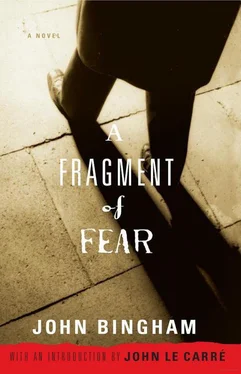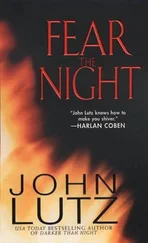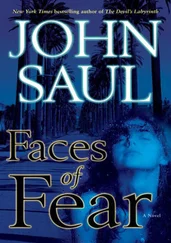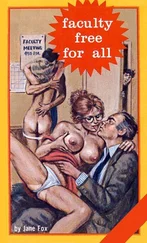John Bingham - A Fragment of Fear
Здесь есть возможность читать онлайн «John Bingham - A Fragment of Fear» весь текст электронной книги совершенно бесплатно (целиком полную версию без сокращений). В некоторых случаях можно слушать аудио, скачать через торрент в формате fb2 и присутствует краткое содержание. Жанр: Триллер, на английском языке. Описание произведения, (предисловие) а так же отзывы посетителей доступны на портале библиотеки ЛибКат.
- Название:A Fragment of Fear
- Автор:
- Жанр:
- Год:неизвестен
- ISBN:нет данных
- Рейтинг книги:3 / 5. Голосов: 1
-
Избранное:Добавить в избранное
- Отзывы:
-
Ваша оценка:
- 60
- 1
- 2
- 3
- 4
- 5
A Fragment of Fear: краткое содержание, описание и аннотация
Предлагаем к чтению аннотацию, описание, краткое содержание или предисловие (зависит от того, что написал сам автор книги «A Fragment of Fear»). Если вы не нашли необходимую информацию о книге — напишите в комментариях, мы постараемся отыскать её.
A Fragment of Fear — читать онлайн бесплатно полную книгу (весь текст) целиком
Ниже представлен текст книги, разбитый по страницам. Система сохранения места последней прочитанной страницы, позволяет с удобством читать онлайн бесплатно книгу «A Fragment of Fear», без необходимости каждый раз заново искать на чём Вы остановились. Поставьте закладку, и сможете в любой момент перейти на страницу, на которой закончили чтение.
Интервал:
Закладка:
In the light, it was a consolation; in the darkness, with the blackness pressing in, and now and then the sound of rain beating against the windows, I realised how alone I now was in this matter.
“You are one,” he had said on the ’phone, and he had proved his point. I could almost hear him, distantly, in the darkness, laugh like a green woodpecker, high, undulating, and mocking. And now, in a half-asleep condition, I began to wish for strange things to happen so that I could triumphantly come into physical touch with reality.
I imagined “Sergeant Matthews” calling again, on some pretext, and myself, ludicrously, tearing off a uniform button and retaining it as proof of his existence; or the same man handing back the message Bunface had given me, saying I could keep it as a souvenir; and there it would be, a proof for me, if for nobody else, that I had not been imagining things; indeed, I wished at one moment that even the telephone might ring in the darkness.
The telephone remained silent, but a board creaked somewhere. My first instinct was to reach for the bedside lamp, yet I hesitated.
If my mind was normal, and it was a man, then for better or for worse I could cope with him and be glad to do so. But if such were not the case, then what would I see? What heraldic animal, what figure from the past, what spirit from another world?
I lay for a few seconds, sweating, struggling back to full consciousness, before I pressed the light switch and saw that the room was empty.
It was at this moment that I was tempted to dress again, and go out into the wet streets, in the strange hope that after some minutes, glancing back, I would see a figure following at a distance.
I gave up the idea, because the experiment would prove nothing. If I could imagine other things, I could imagine that I was being followed; and if, lurking around a corner, I suddenly retraced my steps and tackled the man, he would deny that he was following me. It would be his word against mine. What was mine worth?
Nevertheless, one thing now was clear: if I could reason as logically as that, there was nothing wrong with my mind. The reasoning might have been faulty, but it satisfied me.
I switched off the light, and went to sleep without difficulty.
All that night I was left in peace.
It was almost as if, having inserted the yeast, they were leaving it to ferment the mixture. And in the morning, as I was having my breakfast, I saw an item in the newspaper which finally obliterated all doubts about my mental condition. It was a letter tucked away at the foot of the correspondence column and read:
THE PRISONERS’ FRIEND
Sir,
I have been awaiting the publication of some tribute to Mrs. Harold Dawson, Lucy Dawson to her friends, whose seemingly pointless murder at Pompeii must have shocked so many of her friends. As a Governor of one of H.M. prisons for many years, I came into contact with the wonderful work she carried out, unobtrusively, and indeed secretly, for the rehabilitation of released prisoners.
Hers was largely an individual effort, without the backing of any of the devoted organisations which now carry out this work. She had no office and she had no staff, yet there must be many former criminals who today owe their present happiness and honest prosperity to her tireless work on their behalf.
Let their gratitude be her memorial.
A. Pearson Lt. Col. (Ret.)
14 BENTON HOUSE,
LONDON, S.W.1.
I read the letter through twice with rising excitement.
Here, somewhere, might lie an obscure motive for her murder. I finished my breakfast quickly, grabbed a notebook, and took a taxi to Benton House, which lay behind Eaton Square. On the way, my mind revolved round theories of the psychological reaction of some people towards other people who have helped them including the old one about the desire to strike down the benevolent Father Figure, though in Lucy Dawson’s case it would be the Mother Figure.
I wondered whether Scotland Yard would note the letter, and send a copy to the Italian police, and interview the colonel. Perhaps the colonel could supply a list of names of people she had assisted in the past. Perhaps, somewhere on the list would be the name of one who was again in trouble, who had attempted to extort further assistance, or, if not assistance, then money.
I remembered the pencil marking on her map of Pompeii, and how her meeting with the killer must have been a planned one.
I had a feeling, as I read the letter, that if my well-being was in danger-and I was only on the fringe, so far-then what about the colonel’s? Perhaps that was why I was in such a hurry to see him.
I do not know about subconscious instincts, but I know that by the time my taxi had reached Sloane Street I was aware of a feeling of desperate urgency.
Somebody felt himself menaced by Mrs. Dawson’s past activities. Somebody with power, riches and organisational ability. Somebody who, as Juliet had pointed out during her period of anxiety, was sufficiently cautious to prefer to gain his means by fear rather than risk a killing, if this could be avoided. But somebody who would kill, if need be; who might consider, if he had read the letter, that there was no time to try psychological warfare as far as Colonel Pearson was concerned.
Benton House was a block of old-fashioned mansions turned into flats. I do not think I would have been surprised to find a couple of police cars and an ambulance outside, and a crowd of people being kept back by a constable, and although I saw that the little road was clear, I was still in doubt about what I would find when I reached his flat.
I glanced at the board showing the tenants’ names and saw that his flat was on the second floor. There was an old-fashioned lift, but the cage was in use somewhere at the top of the building, so I ran up the two flights of stairs, and rang the bell.
I was just in time, but not in the way I had imagined.
A small, dapper man in check tweeds, well-polished shoes, and wearing a regimental tie opened the door. He was thin, aged about seventy, with a good head of white hair clipped close round the ears, bright blue eyes and a weather-beaten face.
“Colonel Pearson?”
“Come in-they’re in the kitchen. Just give ’em a rub up,” he said.
I hesitated.
“What are in the kitchen?”
“Aren’t you Brigadier Robertson’s son?”
When I shook my head he smiled and said:
“Sorry-sold my guns to the Brigadier last week. He didn’t want to take ’em then. Said his son would pick ’em up this morning. I was getting worried. Just off in an hour or so.”
He beckoned me in and pointed to some piled luggage in the hall. There were two old-fashioned cabin trunks, a black tin trunk with his name and regiment painted on it in white, an old, battered suitcase, held together with a strap, two fishing rods, binoculars, an ash walking-stick, a mackintosh, and an overcoat. I said:
“Going away for a bit? You’re lucky, with the winter coming on.”
“Going away for good. Going to live in Portugal,” he said shortly. “Can’t afford to live in England. Been struggling to keep this flat going for the last ten years since my wife died. Can’t afford it, or anything else, as far as I can see.”
He looked at me with angry blue eyes.
“Serve your country-thirty years in the Army, and fifteen in the Prison Service, and your country sees to it you can’t afford to live in it. Bad show, you know, dam’ bad show. Still, there you are! What can I do for you?”
“I saw your letter in the paper this morning,” I said, and told what I had in mind. He nodded.
“Poor old Lucy Dawson-bad show. Don’t understand it, I don’t understand it. Come into the drawing room.”
I followed him in, and he stood in front of the empty fireplace, looking around him forlornly.
Читать дальшеИнтервал:
Закладка:
Похожие книги на «A Fragment of Fear»
Представляем Вашему вниманию похожие книги на «A Fragment of Fear» списком для выбора. Мы отобрали схожую по названию и смыслу литературу в надежде предоставить читателям больше вариантов отыскать новые, интересные, ещё непрочитанные произведения.
Обсуждение, отзывы о книге «A Fragment of Fear» и просто собственные мнения читателей. Оставьте ваши комментарии, напишите, что Вы думаете о произведении, его смысле или главных героях. Укажите что конкретно понравилось, а что нет, и почему Вы так считаете.












